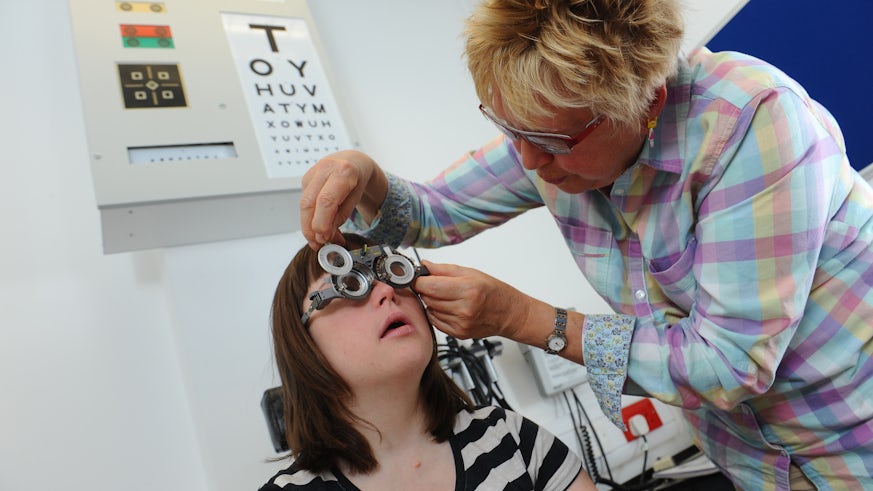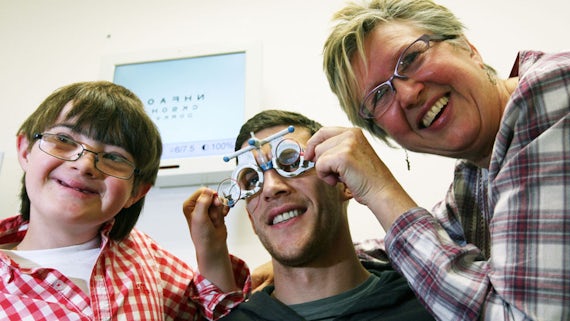Queen’s Anniversary Prize for Cardiff University’s Down’s Syndrome Vision Research Unit
30 November 2017

Cardiff University’s Down’s Syndrome Vision Research Unit has been awarded the UK’s most prestigious academic award – a Queen’s Anniversary Prize – for its pioneering research and treatment of vision problems in children with Down’s syndrome.
The prizes are awarded every two years to universities and colleges across the UK for work of outstanding excellence. This is the first time an optometry unit has received the award.
Speaking of the award, Dr Maggie Woodhouse, Head of the Down’s Syndrome Vision Research Unit, said: “We are extremely honoured by this recognition. It’s a reflection of the dedication and unique research of our staff who are all committed to tailoring and improving eye care for children with Down’s syndrome; It’s incredibly rewarding to be able to improve their learning and educational opportunities and give them the opportunity to thrive and reach their full potential.”

Children with Down's syndrome are at much greater risk of eye and vision disorders than typically developing children, need regular eye examinations, and are more likely to need glasses and compensation in the classroom for visual deficits. Before the establishment of the Down’s Syndrome Vision Research Unit, these specific visual problems were very poorly understood, misinterpreted and undiagnosed. As a result, the Unit was established in direct response to this neglected area of research and is now at the forefront of research in its field.
The Unit’s life-changing research discoveries, such as the process which corrects errors in typical infants fails in those with Down's syndrome, and the benefit of bifocals for their conditions, have directly underpinned national and international guidance on their vision care. The research has also informed training for optometrists and changed the way that those working with and educating young people with Down’s syndrome set up the learning environment.
Learn more about the Down's Syndrome Vision Research Unit.
Changes to sight tests, teaching methods and resources for children with Down's syndrome are just some of the life-changing impacts of the Unit’s work.
Since 1992, the Unit has built the world’s only longitudinal cohort of young people with Down’s syndrome. Currently over 250 children and young adults from all over the UK take part in its studies, ranging from 1-25 years old. Each individual’s visual and general development has been monitored by the Unit over time, making this group and its data unique: it is the largest database of its kind in the world.

"With the support of a large and enthusiastic group of families, our research unit has been given the opportunity to increase understanding of the visual development of children with Down's syndrome, change how their vision problems are perceived and treated, and subsequently revolutionise their eye care practice across the UK and abroad."
The Unit is also the only optometry teaching centre in the UK that directly includes a dedicated course in special needs optometry as part of the undergraduate curriculum.
Over the coming years, members of the Unit plan to turn their attention to implementing a special school eye care service in Wales, by providing training for the optometrists involved. They also aim – through collaborations with partners – to establish a similar service in the other three nations in the UK.
Carol Boys, Chief Executive, Down’s Syndrome Association, said: “I am delighted to hear the news that the Down’s Syndrome Vision Research Unit have been recognised with this award for their pioneering work. Maggie and her colleagues have made an enormous difference to the lives of countless people with Down’s syndrome, both personally, through their research and through their teaching programme as well.”
Share this story
A 22 year study by our researchers gathered evidence on the vision of children and young adults with Down's syndrome and produced recommendations adopted in the UK and abroad.





